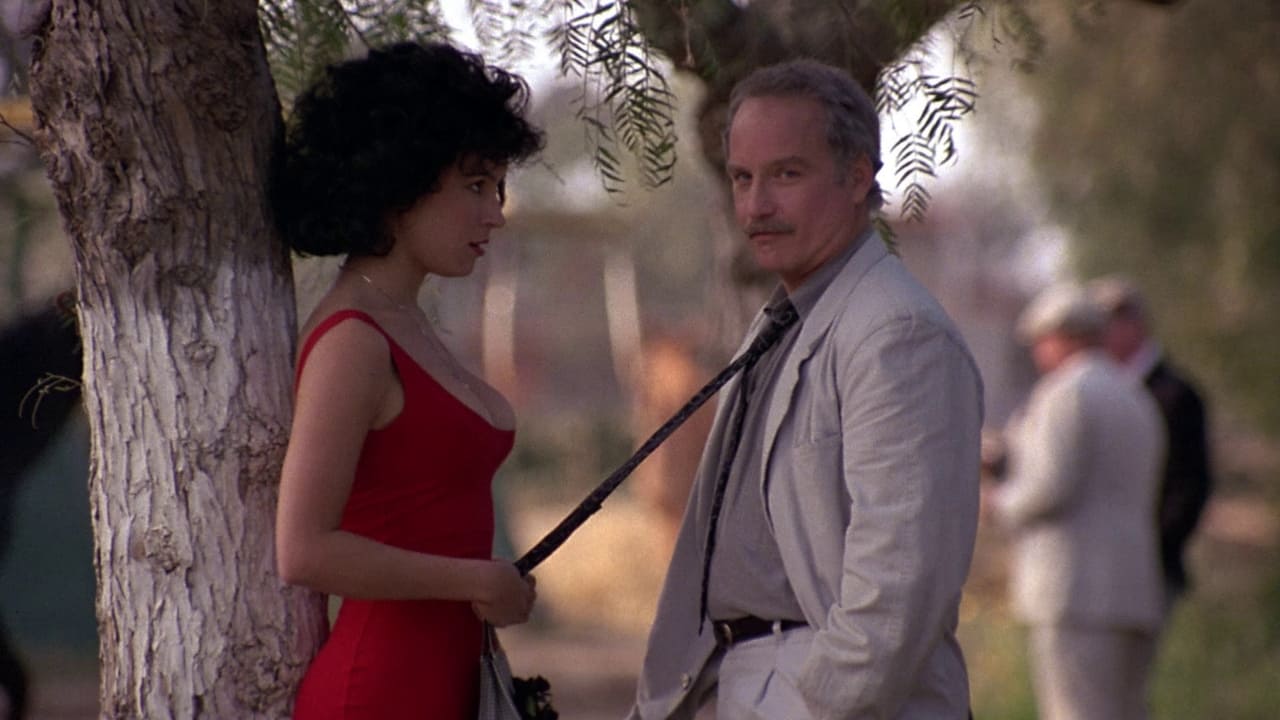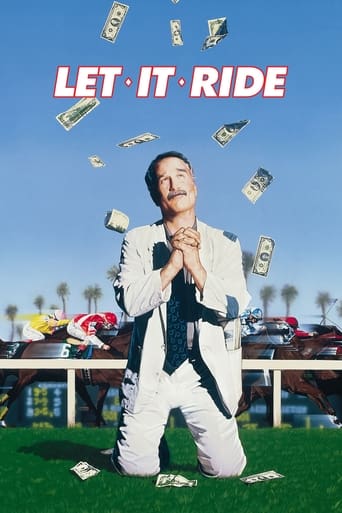otter-stl
I used to bet the horses, so I related a bit to this movie. No, I never had a day like Trotter had, but how I wished. :) This movie had lots of support in the comedy that ensues in the movie. "Cheeseburger" was so good, as was the cashier he returned to after every race he bet. Not a blockbuster, of course, but worth your time to view it. One reviewer said he felt the tension as the last race started and I have to agree. It was rather predictable, but as the horse trainers told Trotter after he returned the audio tape, "You never know!"Fun fun flick!Enjoy!
jaredmobarak
I sometimes forget how blatant music was used in films of the 1980s. Let It Ride may have been made in 1989, but it did not leave that trend behind quite yet. Not only do the cheesy rock ballads come through at the start, the montage shots behind the credits are graced with one that has the title in the lyrics. That's just how Hollywood rolled in the 80s, and the process recalled those films of John Hughes, a man who used song to make a soundtrack for the decade's worth of angst in America's youth. The difference, though, is that this Richard Dreyfuss vehicle is an R-rated work that revels in its vulgarity, sexuality, and poverty-stricken characters gambling and boozing. I'll admit that going in I had no clue exactly what to expect, figuring it was Dreyfuss's Trotter watching his life go down the toilet. So, to my surprise, the entire story surrounds his day at the track, arriving with a hot tip and riding the wave of good luck until the tension of losing it all becomes too much to handle—for everyone around him.Literally spanning the course of one day at the horse track, after Trotter's buddy Looney records, amidst the smut that usually occurs, an exchange between two nefarious dealers in the back of his cab talking about a fix the night before, Let It Ride doesn't have too much plot to mess with the laughs at its core. Trotter is down on his luck, thinking he deserves more than the life he's been given, including a set of friends that have all their teeth. Looking to turn things around, he and his wife, played nicely by a comedic Teri Garr, make vows to change the way they treat each other, making plans to reconcile and make love the next afternoon. That event soon gets pushed to the side, though, as he cannot believe the information Looney has brought to him, listening to the tape over and over again until he finally decides to end his ban on gambling and bet the sure thing while Garr waits at home in bed.And here is where the fun really begins. Dreyfuss is the epitome of smug, the guy everyone likes because he is a loser that never stops, but also despise when winning for the simple fact that they aren't the ones holding the lucky tickets. Throwing caution to the wind, Trotter makes his way to the $50 Win booth for a bet on the long-shot, after praying to God for the victory inside his favorite bar's restroom, above the far from pristine toilet bowl. Laughed at by the booth worker, chided by fellow bettor Tony Cheeseburger, and bombarded with pessimism from his best bud Looney about listening to information that was too good to be true, he goes for it anyway, watching his luck turn. One win leads to a chain of events for more; even the dismal moments of owed bookies and false arrests somehow work out for the better. But no matter how much cash he stuffs in his shoes, Garr's wife Pam slowly moves further and further away, opening her eyes to the cretin her husband really is. That distance, though, and Trotter's good fortune, only works together to make him finally realize what it is he has at home, despite the ample cleavage of Jennifer Tilly's Vicki available for the taking.So, the main point of the film becomes whether Dreyfuss can continue to win. You begin to fall into one of two camps, either the one hoping it doesn't stop or the one that can't wait to see the fallout when it all ends. Therefore, the cast of eccentrics weaving in and out of his life start to be the main driving force behind the plot. It is quite the menagerie of losers, rich elite, crooks, and bored track employees. Dreyfuss himself really does put the film on his back and never steps off the gas as he rides the luck for as long as he can. Never afraid to speak his mind, he has the wonderful trait of being able to completely alienate all those that care about him. Feeling that he is better than them all, the cavalier attitude does begin to fail a bit when his friends fall into trouble, realizing that although he wishes they weren't the people he was stuck with, they are the ones he's become attached to. This is especially true with Looney, his dimwitted pal that is so unlucky, his demise is actually the catalyst to Trotter's winning ways. David Johansen's portrayal is fantastic, complete with childlike facial expressions and the innocence of just talking forever, unaware of the consequences or the definition of tact.The rest of the cast is pretty hilarious—keeping the laughs coming and disguising the fact the film is just replaying the same event four different times with four different races. Richard Dimitri is over-the-top as the gold chain wearing Tony Cheeseburger, switching his allegiances to whomever has the hot hand; John Roselius is funny as the gruff, peripheral-sighted police officer; and Tony Longo does what he does best, standing big and tall as the heavy who cashes in by charging people to stand by the track's rails. As for the most memorable role, that goes to Robbie Coltrane's ticket taker as a stand-in for the audience with perfect comedic timing. He watches the craziness going on around Trotter, at first dismissing him as the loser we assume he is, but eventually warming up to hail him as his hero, the most fearless man he's ever witnessed at the track. We go through the exact same progression, eventually allowing ourselves to root for the underdog and think that if he can have a day of absolute success, maybe we can too.
Mister OEX
I really liked this movie. Sure, it isn't IMDb top 100, but there are more than a few genuinely funny moments. Richard to David: "What, you like the odds on lightning?" But my favorite part is when Richard and Jennifer were cheering on Fleet Dreams. What happens after Richard wins is classic, especially to anyone that has ever made horse bets. Richard: "God likes me, he really, really likes me". "Wow, what a day, what a day, what a fabulous day". Woman patron in the Jockey Club: "they ought to put a guard on the back door so that sort doesn't get in here". Anyone that has ever dealt with so-called high society will really enjoy this scene.

